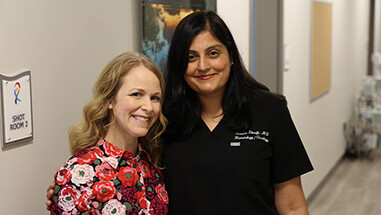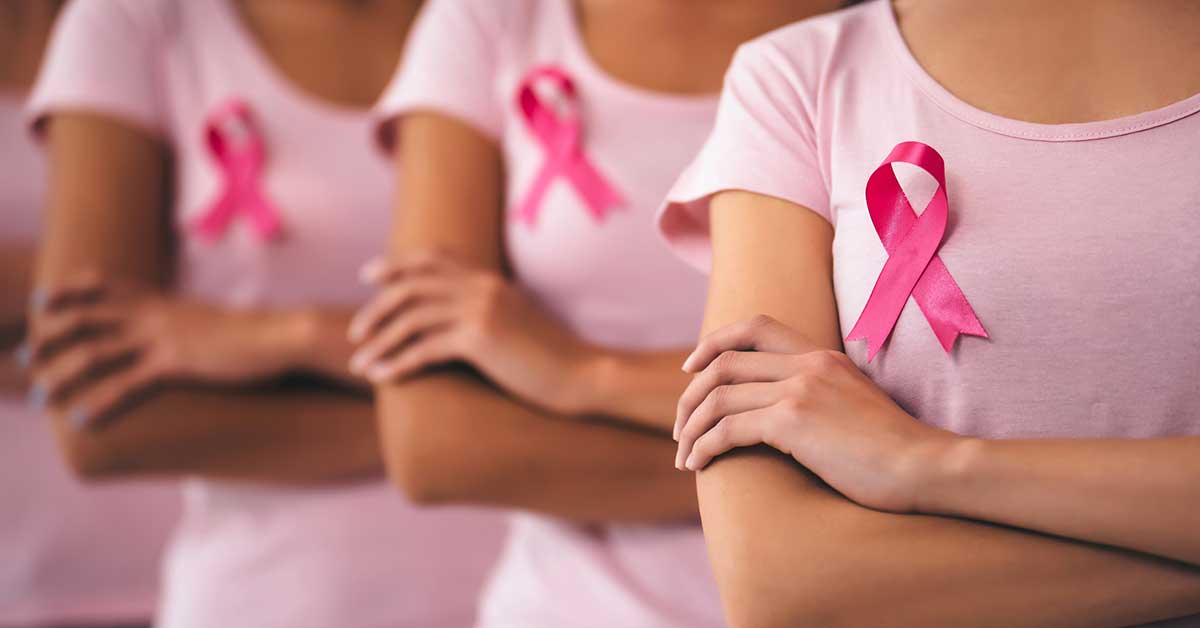Breast Cancer
Contact Us
What is breast cancer?
Breast cancer starts when normal, healthy cells in the tissues of the breast become changed or altered and begin to grow out of control. A build-up of these cells often forms a mass of tissue called a lump, growth or tumor. These cancer cells have the potential to get into the blood or lymphatic system and spread (referred to as metastasize) to other areas of the body. Breast cancer can occur in one or both breasts and can start from different areas of the breast. There are many subtypes of breast cancer, and each must be treated differently.
Breast Cancer Quick Facts
- About 1 in 8 women in the U.S., or 12%, will develop breast cancer by age 85.
- Breast cancer is the most common cancer in American women, except for skin cancers. It is estimated that in 2023, approximately 30% of all new cancer diagnoses among women will be breast cancer.
- Although rare, men get breast cancer, too. This year, it is estimated that nearly 3,000 American men will be diagnosed with breast cancer.
What are the risk factors and who is most at risk?
- We don’t know exactly what causes breast cancer. Our genes, lifestyle, and the environment around us may raise or lower our risk of getting cancer.
- Extensive research has led us to understand several risk factors for developing breast cancer: genes, lifestyle and environment all play a part. Unfortunately for women, being female and getting older increases our risks. This is why it is so important to stay vigilant in our awareness of breast cancer, get screenings and remove barriers that often prevent effective prevention and detection.
- Being female and getting older are the greatest risks. The risk nearly doubles if a woman has a first-degree relative who has been diagnosed with breast cancer.
Is screening for breast cancer important?
- Absolutely yes! Breast cancer is sometimes found after symptoms appear, but many women with breast cancer have no symptoms. This is why regular breast cancer screening is so important.
- Simple screening tests can detect breast cancer early, even before symptoms appear. When cancer is detected early, treatment is much more effective.
- The earlier cancer is detected, the easier it is to treat – and that translates to better outcomes for patients.
- In its earliest stages, where the cancer is localized and has not spread outside of the breast, the five-year relative survival rate is 99%. The majority of breast cancer cases (@ 61%) are diagnosed at this stage.
- Mammography, an X-ray method used to examine breast tissue, is a vital screening technique for early detection and treatment. These simple tests can detect breast cancer early, even before symptoms appear, making treatment much more effective. Mammograms are safe and generally not painful. Any temporary discomfort is well worth the benefits. Over 40? Book your mammogram today.
What are the recommended breast cancer screenings for women?
- Mammograms, low-dose X-rays of the breast, are the best test physicians have to detect changes in the breast and find breast cancer early.
- This is a vital screening technique for early detection and treatment. These simple tests produce mammograms, which can detect breast cancer early, even before symptoms appear, making treatment much more effective. The earlier cancer is detected, the easier it is to treat. Mammograms are safe and generally not painful. Any temporary discomfort is well worth the benefits. Over 40? Book your mammogram today.
- The American Cancer Society recommends these general guidelines for women with no family history of cancer:
- Yearly for women ages 45 to 54 (or at age 40 if they wish)
- Every two years for women ages 55 and older
- An abnormal mammogram does not always mean that cancer exists, but follow-up tests may be recommended.
- Mammograms are not routinely offered to men and may be difficult to perform if there is a small amount of breast tissue.
- Women and men are advised to be familiar with how their breasts normally look and feel and report any changes to their health care provider right away.
- Know your family health history and inform your healthcare provider of any specific risk factors. Genetic testing may be recommended.
- Schedule an annual physical with your primary care physician as well as an annual Ob-Gyn visit.
Have breast cancer treatment and survivorship rates improved?
- A cancer diagnosis of any type is frightening, but for women, breast cancer is especially scary.
- There is good news when it comes to breast cancer. Scientific advances are transforming the way we treat breast cancer.
- Genetic testing, such as what we have available at FCS, can detect specific mutations unique to each patient. This allows us to personalize treatment that is most appropriate for that particular cancer.
- Immunotherapies boost or change the body’s own immune system to work harder and smarter to find, target and attack cancer cells.
- New drugs, including some that block certain types of proteins, are showing great promise.
- In recent years, we have seen a gradual reduction in the incidence of female breast cancer rates among women 50 and older. Death rates have also been declining since about 1990, thanks to better screening and early detection, increased awareness and continuous advancements in treatment options. In fact, there are over 3.8 million breast cancer survivors in the United States.
What are the best things women can do to reduce the risk of cancer and other health conditions?
There are some simple things women can do to stay healthy:
- Stay away from all forms of tobacco. If you smoke or vape, quit.
- Maintain a healthy diet and weight. Eat plenty of fruits and vegetables daily. Get moving and keep moving with regular physical activity.
- Limit alcohol consumption to no more than one drink per day.
How does FCS treat breast cancer?
FCS is committed to advancing treatment and outcomes for breast cancer patients. Each year, dozens of clinical trials are conducted within FCS to find newer, better and more targeted treatments for breast cancer and its many forms. Our physicians have been involved with several of the most recent developments for breast cancer therapies and have presented their findings at national and international forums.
It’s important to note that not all breast cancer is the same. Nor should it be treated the same. FCS offers patients access to next-generation sequencing, a form of testing that analyzes cancer cells to detect the genetic mutation causing the cancer. With this information, our team of molecular scientists can identify which treatment should be the most effective by matching the mutation with the best therapy for that specific type of breast cancer. By having genetic testing and systems such as this in place, FCS is effectively improving how we care for our breast cancer patients.





